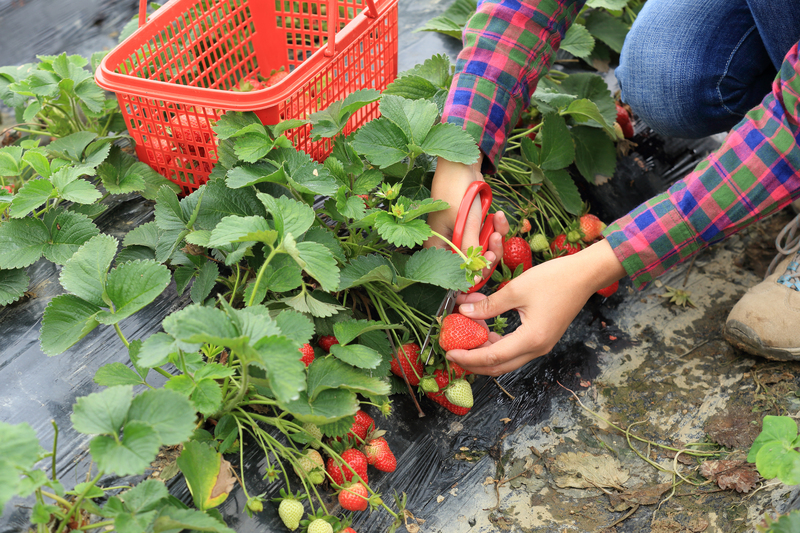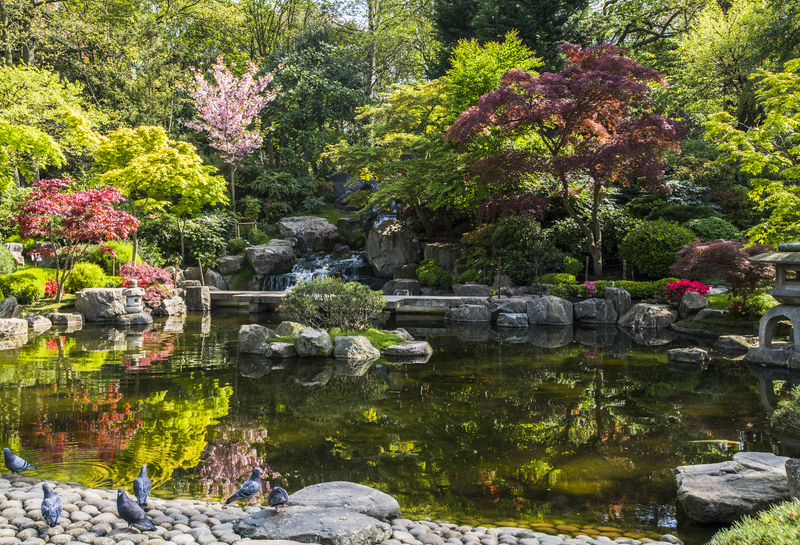Secrets to Thriving Herb Gardens
Posted on 10/06/2025
Secrets to Thriving Herb Gardens
Are you dreaming of lush, fragrant herbs spilling over pots on your windowsill or thriving in your backyard garden? Cultivating a flourishing herb garden isn't just a pleasure--it's a journey into the world of culinary delights, natural remedies, and aromatic beauty. Whether you're a green-thumbed gardener or a complete beginner, you can grow a thriving herb garden with the right tips and care. In this article, we'll reveal the secrets to successful herb gardening, tackling everything from soil health to creative design, and ensuring your herb garden flourishes all year round.
Why Grow Your Own Herbs?
- Fresh Flavor: Homegrown herbs provide unbeatable aroma and taste in your dishes, from basil on pizza to mint in tea.
- Health Benefits: Herbs are rich in antioxidants, vitamins, and natural compounds beneficial for health.
- Cost-Friendliness: Growing herbs is often cheaper than frequently buying bunches from the grocery store.
- Eco-Friendly: Reduce your carbon footprint by cutting down on store-bought, plastic-wrapped herbs.
- Therapeutic Value: Gardening is proven to reduce stress and boost well-being.

Understanding Herbs: Annuals, Perennials, and Biennials
Before digging into the best ways to grow a healthy herb garden, it's helpful to understand the different types of herbs:
- Annuals: Complete their life cycle in one year (e.g., basil, cilantro, dill)
- Perennials: Live for several years, returning each season (e.g., thyme, mint, oregano, sage)
- Biennials: Take two years to mature (e.g., parsley, caraway), usually harvested at the end of the second year.
Knowing the lifespan of your herbs helps with planning your garden for continuous harvests.
Choosing the Best Spot: Sun, Shade, and Space
Sun Needs for Thriving Herb Gardens
Most herbs love the sun-- a minimum of six hours of direct sunlight per day is ideal for lush growth and strong flavors. However, some herbs tolerate or even prefer partial shade--such as parsley, chives, and cilantro.
- Full Sun: Basil, rosemary, oregano, thyme, sage, lavender
- Partial Shade: Mint, chives, parsley, cilantro
Space & Drainage
Good air circulation and well-draining soil are crucial secrets to a long-lasting herb garden. Cramped, soggy roots can lead to mildew and root rot. If your native soil is heavy or waterlogged, consider raised beds, vertical planters, or containers.
Soil: The Foundation for Healthy Herb Gardens
Healthy herbs start with healthy soil. "Feed the soil, not the plant" is the mantra of experienced gardeners. Here's how:
- Well-Drained Soil: Loam or sandy soil mixed with compost is perfect.
- pH Balance: Most herbs thrive in slightly acidic to neutral soil (pH 6.0-7.0). Test your soil and adjust as necessary with lime or sulfur.
- Organic Matter: Add compost or well-rotted manure to enrich the soil and improve texture and water retention.
Tip: Avoid heavy clay or constantly soggy soil, which suffocates roots and promotes disease.
Planting Secrets: Seeds, Seedlings, or Cuttings?
How you start your herb garden depends on your timeline and herb choice. Here's a breakdown:
- Seeds: Cost-effective and offer a broad selection. Herbs like basil, cilantro, parsley, and dill grow easily from seeds. Tip: Some herbs (like cilantro and dill) don't transplant easily, so sow them directly where you want them to grow.
- Seedlings: Convenient and quicker. Buy as young plants from garden centers. Great for more demanding herbs like rosemary or lavender.
- Cuttings: For woody perennial herbs such as rosemary, sage, and thyme, stem cuttings from mature plants root well in moist soil.
Watering Wisdom for Robust Herb Gardens
Herbs like evenly moist--but not soggy--soil, especially when young. Here are the key watering secrets:
- Water at the Base: Wet leaves invite mildews and mold. Use a watering can or drip system at the soil line.
- Allow Soil to Dry Slightly Between Watering: Stick your finger into the soil; water if the top inch is dry.
- Morning is Best: Reduces risk of disease and lets plants dry before evening.
- Mulch: A thin mulch of straw or compost helps retain moisture, moderate soil temperature, and suppress weeds.
Overwatering is a common cause of herb failure. Remember, most Mediterranean herbs prefer things on the drier side.
Harvesting Tips: Reap and Encourage Regrowth
Knowing when and how to harvest is critical for a perennial herb garden that thrives:
- Harvest Early: Pick herbs in the morning after dew dries but before the sun is strong--oils (and flavor) are most intense.
- Pinch and Snip: Use clean scissors or pruners to cut just above a leaf node. This encourages bushy regrowth.
- Don't Over-Harvest: Never remove more than one-third of the plant at any time; this keeps your herbs healthy and productive.
- Regular Harvesting: Promotes new growth, especially for basil, mint, and oregano.
Secrets to Preventing Pests and Diseases Naturally
One big advantage of herbs is their natural pest resistance. Their aromatic oils deter many insects, but here's how to keep your herb garden flourishing safe from problems:
- Good Spacing: Ensures airflow and reduces fungal issues.
- Interplanting: Grow pest-repelling herbs like basil and thyme near vegetables to deter aphids, whiteflies, and hornworms.
- Companion Planting: Pair compatible herbs for mutual benefit. For example, plant chives and garlic with roses to reduce black spot fungus.
- Healthy Soil: Vigorous plants resist disease better.
- Organic Solutions: If you spot trouble, use insecticidal soap, neem oil, or simply pick off large pests by hand.
Avoid chemical pesticides--they ruin flavor and compromise the natural health benefits of your herbs.
Secrets to Indoor and Balcony Herb Gardens
Adapting Your Herb Garden to Small Spaces
You don't need lots of land! Here's how to enjoy a thriving herb garden indoors or on your balcony:
- Choose Compact Varieties: Dwarf basil, oregano, and compact chives work well in pots.
- South-Facing Window or Grow Lights: Herbs need bright, direct light. Supplement with LED grow lights if needed.
- Containers with Drainage: Prevent root rot by using pots with holes and a tray.
- Avoid Overcrowding: Give each herb its own space to thrive.
- Humidity: Most indoor environments are dry. Mist the air (not the leaves) or use a pebble tray.
Best Herbs for Beginners and Advanced Gardeners
Beginner-Friendly Herbs
- Basil: Fast-growing, delicious, and widely used in many dishes.
- Mint: Super easy, but be sure to contain it--it spreads vigorously.
- Chives: Hardy and low-maintenance.
- Parsley: Biennial but grows like an annual with plenty of use.
- Thyme: Drought-resistant and flavorful.
Herbs for the Dedicated Gardener
- Lavender: Needs well-drained soil and lots of sun. Perfect for aromatherapy and culinary uses.
- Rosemary: Mediterranean in origin, prefers drier soil and good air circulation.
- Saffron: Saffron crocus needs patience but yields exotic spice.
- Bay Laurel: A flavorful addition for soups, though slow-growing.
Creative Design Tips for Gorgeous Herb Gardens
Morph your herb garden into a visually striking feature with these tips:
- Spiral Herb Gardens: Build a raised spiral using stones or bricks. It maximizes planting area and provides microclimates for different herb needs.
- Themed Beds: Grow herbs by kitchen use (Italian, tea, medicinal) or color for visual appeal.
- Companion Planting: Mix herbs with flowers to attract pollinators and beautify your garden.
- Vertical Gardens: Use wall planters or hanging shelves for balconies and small spaces.
- Container Groupings: Mix various herbs in attractive pots for a mobile, flexible garden.
Year-Round Herb Gardening Secrets
How to Keep Herbs Thriving Through All Seasons
- Overwinter Perennials: Move potted herbs indoors before the first frost, or protect outdoor beds with mulch.
- Seasonal Succession Planting: Sow new seeds every few weeks for continual harvests, especially for short-lived annuals like cilantro and dill.
- Harvest and Store: Dry or freeze surplus herbs for off-season use (bundle and hang, or chop and freeze in ice cube trays).
- Use Cold Frames or Greenhouses: Extend your growing season for tender perennials and annuals.

Troubleshooting Common Herb Garden Problems
Yellowing Leaves?
- Overwatering: Check soil moisture. Let it dry before watering again.
- Poor Drainage: Improve with compost or plant in pots with holes.
- Low Nutrients: Feed with an organic, balanced fertilizer.
Leggy, Weak Growth?
- Not Enough Light: Move herbs to a sunnier spot or add grow lights.
- Overcrowding: Thin out seedlings; give each plant space.
Pest Damage?
- Aphids or Mites: Rinse leaves with water or use insecticidal soap.
- Caterpillars or Slugs: Handpick or use organic barriers like crushed eggshells.
Conclusion: Cultivating Abundant, Flavorful, and Healthy Herbs
Whether you're hoping to spice up your meals, enhance your garden's beauty, or just enjoy the therapeutic value of gardening, growing a thriving herb garden is within everyone's reach. Embrace these secrets: select the right location, build healthy soil, master watering, harvest wisely, and adapt to your space. With these herb gardening secrets, you'll enjoy endless supplies of fresh, organic herbs, delicious food, and a touch of green serenity all year long.
Ready to start your own flourishing herb garden? Put these tips into practice, experiment with new varieties, and share your passion with friends and family. Happy gardening!

